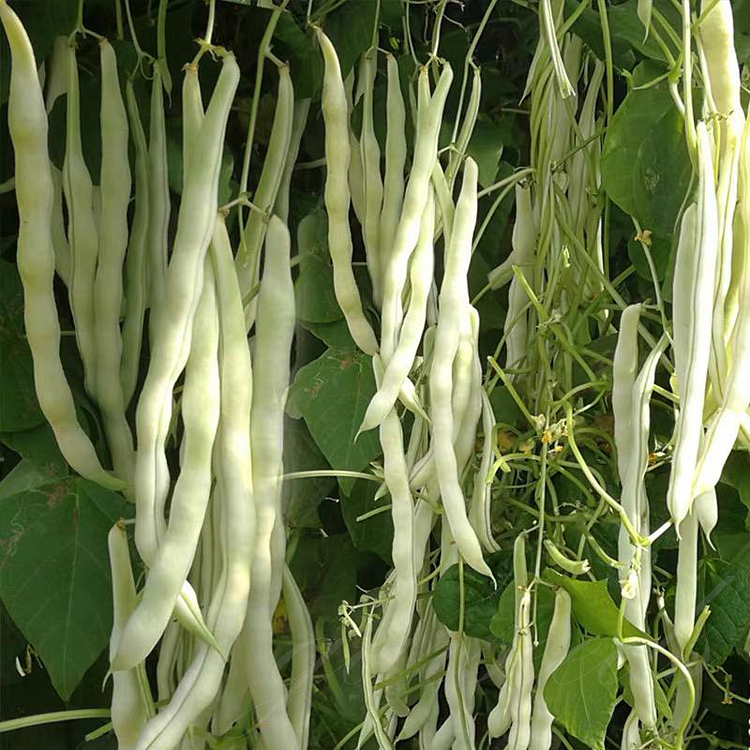Kidney Bean Seeds
Couldn't load pickup availability
Description
Kidney beans are a popular legume known for their rich, deep red color and kidney-like shape. They are packed with protein, fiber, and essential nutrients, making them an excellent addition to any garden or diet. Kidney Bean Seeds are easy to grow and thrive in warm weather, providing a hearty harvest of nutritious beans that can be used in a wide variety of dishes such as soups, stews, salads, and chili. Whether you're a seasoned gardener or a beginner, these kidney beans will yield a bountiful crop perfect for homegrown meals.
Why Choose Kidney Bean Seeds?
- High Yield: Kidney beans are known for their impressive yield, making them an excellent choice for gardeners looking to grow a large quantity of beans.
- Nutrient-Dense: Packed with protein, fiber, iron, and potassium, kidney beans are an incredibly healthy food choice.
- Easy to Grow: Kidney beans are straightforward to plant and care for, making them suitable for gardeners of all experience levels.
- Versatile in the Kitchen: Kidney beans are used in a wide range of recipes, from hearty soups and stews to salads and chili.
- Long Shelf Life: Once harvested and properly dried, kidney beans have a long shelf life, providing you with fresh, homegrown beans throughout the year.
How to Grow and Care for Kidney Bean Seeds
Planting:
- When to Plant: Kidney beans should be planted after the last frost date when the soil temperature reaches at least 70°F (21°C). They are sensitive to frost and require warm temperatures to thrive.
- Spacing: Plant seeds 1-2 inches (2.5-5 cm) deep and space them about 2-4 inches (5-10 cm) apart in rows. Leave about 18-24 inches (45-60 cm) between rows to allow for ample growth.
- Soil: Kidney beans grow best in well-draining, sandy loam soil. The soil should be rich in organic matter and have a pH of 6.0-7.0.
- Sunlight: Kidney beans require full sun for optimal growth. Ensure the plants receive at least 6 hours of direct sunlight each day.
Growth Conditions:
- Watering: Keep the soil consistently moist but not waterlogged. Beans need regular watering during their growing period, especially when the pods start to form. However, avoid overwatering, as this can lead to root rot.
- Temperature: Kidney beans thrive in temperatures between 70°F and 90°F (21°C-32°C) and need warmth to mature properly.
- Mulching: Mulch around the base of the plants to retain moisture, suppress weeds, and maintain even soil temperatures.
Care:
- Fertilizing: Kidney beans are nitrogen-fixing plants, meaning they help enrich the soil with nitrogen. However, they still benefit from a light application of balanced fertilizer during planting.
- Pests and Diseases: Kidney beans are generally pest-resistant, but be on the lookout for aphids, bean beetles, and fungal diseases. Organic pest control methods, like neem oil, can be used if necessary.
- Supporting the Plants: As kidney beans grow, they may benefit from staking or trellising to help them stay upright, especially for pole varieties.
Harvesting:
- Kidney beans are ready for harvest when the pods are dry, and the beans inside rattle when shaken. Typically, this occurs about 90-120 days after planting, depending on the variety.
- Harvest the pods by hand and allow them to fully dry out before shelling the beans. You can also leave the plants in the ground longer if needed, but ensure the beans are completely dry before storing them.
Benefits of Growing Kidney Bean Seeds
- High Nutritional Value: Kidney beans are an excellent source of plant-based protein, dietary fiber, iron, and potassium, making them a staple in vegetarian and vegan diets.
- Sustainable Food Source: Growing your own kidney beans can provide you with a self-sustaining source of protein and fiber, reducing your reliance on store-bought options.
- Cost-Effective: Kidney beans are easy to grow in home gardens, saving you money by providing fresh, homegrown beans throughout the season.
- Versatile Culinary Uses: Kidney beans are incredibly versatile, adding flavor and texture to a wide variety of dishes, from salads to soups to casseroles.
- Long Shelf Life: Once harvested and dried, kidney beans can be stored for long periods, ensuring a continuous supply of nutritious beans for months.
Kidney Bean Seeds are a must-have for any home gardener looking to grow a high-yield, nutritious crop. Whether you're growing them for their culinary benefits or their ability to enrich the soil, kidney beans offer an excellent return on investment and are an enjoyable crop to grow in your garden.





